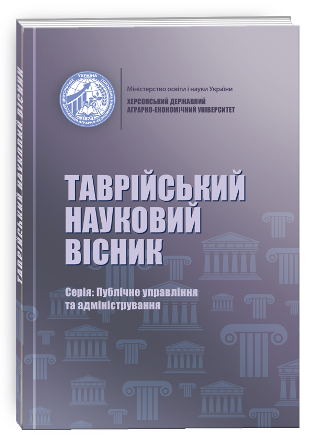ORGANIZATIONAL AND ECONOMIC INSTRUMENTS FOR IMPLEMENTING GREEN PUBLIC POLICY
DOI:
https://doi.org/10.32782/tnv-pub.2025.1.10Keywords:
innovations, public management and administration, efficiency of public management, Big Data, digital transformationAbstract
The article explores the organizational and economic instruments for implementing Green Public Policy (GPP) in Ukraine, their impact on sustainable development, and the environmental transformation of the economy. The key organizational and economic instruments of state regulation in the field of environmental policy have been identified, including legislative acts, environmental taxation, public procurement of environmentally friendly products, and digital technologies for environmental monitoring. The main legislative initiatives aimed at implementing GPP in Ukraine have been analyzed, including the laws «On Environmental Protection», «On Energy Efficiency», and «On Alternative Energy Sources». It has been determined that environmental taxation, particularly the CO₂ emissions tax, serves as an essential instrument for encouraging enterprises to adopt environmentally friendly technologies. Special attention has been given to public procurement of environmentally friendly products as an organizational and economic instrument for implementing GPP. It has been established that this instrument is an effective way for the state to influence the development of the green economy and reduce environmental impact. The role of digital technologies in the implementation of Green Public Policy has been examined, specifically the use of satellite monitoring, Big Data, and artificial intelligence to analyze the environmental situation. It has been determined that the development of such technologies facilitates effective compliance control with environmental standards and helps predict crisis situations. Additionally, the key barriers that hinder the effective implementation of GPP in Ukraine have been identified. These include insufficient support from the government and businesses, low public awareness, inadequate regulation of environmental standards, weak integration of environmental policy at the local level, and the negative impact of military actions. Possible ways to overcome these barriers have been analyzed, such as strengthening financial and legal support, promoting innovation in green technologies, conducting information campaigns, and enhancing environmental control. As a result of the research, it has been concluded that a comprehensive approach combining legal, economic, and technological solutions is necessary for the effective implementation of Green Public Policy in Ukraine. The further development of environmental regulations, the expansion of digital monitoring capabilities, and the promotion of environmental awareness among the population will contribute to the country’s sustainable development.
References
Porter, Michael E., and Claas van der Linde (1995) Toward a New Conception of the Environment-Competitiveness Relationship. Journal of Economic Perspectives, 9 (4), 97–118 pp.
Nordhaus, William, D. (2007) A Review of the Stern Review on the Economics of Climate Change. Journal of Economic Literature, 45 (3), 686–702 pp.
Richard York, Eugene A. Rosa, Thomas Dietz (2008) The Ecological Footprint Intensity of National Economies. Journal of Industrial Ecology, 8 (4) 139–154 pp.
Перга Т.Ю. (2014) Глобальна екологічна політика та Україна: монографія. Ніжин: Видавець ПП Лисенко М.М., 288 с.
Князєва Т.В. (2014) Міжнародна екологічна політика: теорія, методологія, сценарії розвитку: монографія. Херсон: ПП Вишемирський В.С., 384 с.
Малолітнева В. (2021) «Зелені» й соціально відповідальні державні закупівлі: посилення публічних начал у правововму регулюванні та нові умови міжнародної конкуренції, Господарське право і процес, 3, 99–107 сс.
Rio Declaration on Environment and Development (1992), електронний ресурс: https://www.un.org/ru/documents/decl_conv/declarations/riodecl.shtml (дата звернення 03.05.2025).
Закон України № 1264-XII від 25.06.1991 «Про охорону навколишнього природного середовища», електронний ресурс: https://zakononline.com.ua/documents/show/155298___599695 (дата звернення 01.03.2025).
Закон України № 2849-IX від 13.12.2022 «Про оцінку впливу на довкілля», електронний ресурс: https://zakon.rada.gov.ua/laws/show/2059-19#Text (дата звернення 02.03.2025).
Закон України № 2320-IX від 20.06.2022 «Про відходи», електронний ресурс: https://zakon.rada.gov.ua/laws/show/187/98-%D0%B2%D1%80#Text (дата звернення 26.02.2025).
Закон України № 2392-IX від 09.07.2022 «Про енергетичну ефективність», електронний ресурс: https://zakon.rada.gov.ua/laws/show/1818-20#Text, (дата звернення 03.03.2025).
Закон України № 601-VI від 25.09.2008 «Про альтернативні джерела енергії», електронний ресурс: https://zakon.rada.gov.ua/laws/show/555-15#Text (дата звернення 05.03.2025).
Податковий кодекс України, електронний ресурс: https://zakon.rada.gov.ua/laws/show/2755-17#Text (дата звернення 05.03.2025)
Екологічна платформа України (2020), електронний ресурс: https://eco.gov.ua/ (дата звернення 06.03.2025).
Еко-міста та екокластери, електронний ресурс: https://ucluster.org/universitet/klastery-ukraina/2012-study/vpliv-globalizacii-na-shlyakhi-zbalansovanogovodokoristuvannya-okhoroni-ta-vidtvorennya-vodnikh-resursiv/eko-mista-i-ekoklasteri/(дата звернення 06.03.2025).







